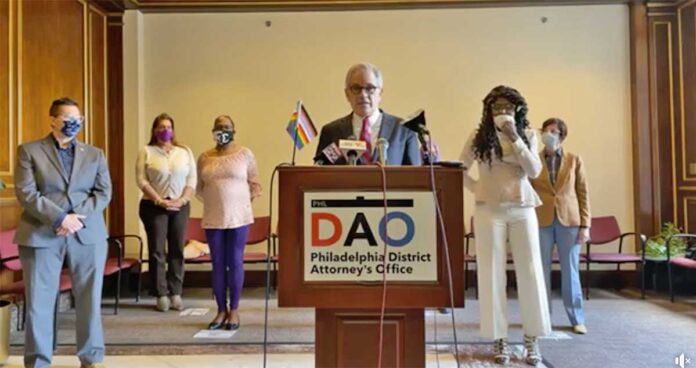The District Attorney’s Office (DAO) recently created a method of tracking LGBTQ+-related crimes in the city of Philadelphia. DAO staffers hope that doing so will help provide resources to queer and trans people, “whether or not they are victims of a crime or even just if they’re the defendants,” said DAO LGBTQ+ Liaison Kelly Burkhardt, who with her colleagues devised the tracking system.
“LGBTQ folks, because of being such a marginalized population, that tends to continue on especially into these systematic processes and systems.”
Prior to using the tracker, Burkhardt encountered roadblocks in terms of identifying LGBTQ victims in her work. She would ask her colleagues if they were working on cases with queer or trans victims, or periodically overhear conversations about cases involving LGBTQ folks.
“We recently in the last year formed the [LGBTQ] affinity group,” Burkhardt said. “I was complaining that we had a hard time identifying this and then we started kicking things around.”
Tyler Tran, senior data analyst for the DAO, pulled a lot of weight in actualizing the idea behind the tracking mechanism. He works in the data lab where he and his colleagues carry out accountability and transparency-centric research and analyses.
“The tool is just really to help funnel resources and support to people who might need it,” Tran said. “It’s some of the most vulnerable populations that we’re working with.”
The system can also help convey information on upward or downward trends in crimes involving LGBTQ people. Not only has Philadelphia seen an increase in shootings and homicides in the past year, at least two Black trans women, Dominique Rem’mie Fells and Mia Green, were fatally attacked in the city and two other trans women of color survived their attacks.
“We are glad to see that LGBT victims are being looked at, [and that] the DA is championing the victims of any crime, including those LGBT members,” said a representative from the Greater Philadelphia chapter of the Gay Officer’s Action League.
The crimes are tracked by filtering out LGBTQ-related key words in police arrest write-ups. When buzzwords show up, Burkhardt, Tran and a few other DAO staff members receive an email so they can manually verify whether those cases fit the bill.
“Outside of the keywords, we’re basically trying to find things that are identifying individuals, or words or phrases like ‘his boyfriend,’ ‘her girlfriend,’ which I think is what has alerted us the most,” Burkhardt said. “I also like that we have a keyword like ‘fruity’ some of the older school terms, besides the derogatory terms that unfortunately a lot of us may have heard in our past.”
Due to the nature of data capture and human error, the tracking system is not always 100% accurate, Burkhardt said. Bias also plays a part in the system’s efficacy. If a victim is misgendered, the process of getting resources to them could take longer. Burkhardt used the example of the woman who was stabbed in East Mount Airy earlier this year.
“We knew it was a transgender woman because of how the media reported it,” Burkhardt said. “But we did not have any contact information with anybody until Northwest Victim Services reached out to me.”
Not only does the tracking tool facilitate resources for victims, it serves as a method of LGBTQ crime data collection for the city of Philadelphia, which could influence DAO policy as well as municipal policy, Burkhardt pointed out. She hopes that the data will lead to the addition of sexual orientation and gender to Pennsylvania’s hate crimes law.
Like many laws that grant rights to queer Americans, LGBTQ-inclusive hate crime laws exist as a state by state, patchwork of legislation across the U.S. Philadelphia has a hate crimes ordinance that includes sexual orientation and gender identity, but Pennsylvania is one of 10 states that contains neither gender nor sexual orientation in its state-wide hate crime law, according to the Movement Advancement Project.
Deja Lynn Alvarez, who sits on the DAO’s newly formed LGBTQ+ Advisory Committee, paralleled Burkhardt’s hope that the collection of LGBTQ crime data will lead to policy changes.
“Data collection is how we’re able to fund particular services for things like HIV and addiction,” Alvarez said. “We can’t get any of that until we start collecting data on it. The fact that the District Attorney’s Office is taking initiative to start tracking the [crime] data is huge because it’s going to allow the studies necessary that we can then utilize when we are trying to create legislation or policy, whether it be in the city, the state or federally.”
Alvarez expressed optimism that District Attorney Larry Krasner would share the crime data with other district attorney’s offices or cities in order to “give us a larger network to continue to push legislation that protects LGBTQ people nationally,” she said.
Burkhardt and Tran believe that their tracking system is one of a kind in the U.S.
“I don’t personally know if other offices are doing something like this,” Tran said. “From a technology standpoint this is a pretty simple tool, it’s not some wild algorithm. It just requires that people care about these issues, and that people put in a little bit of work to help.”

